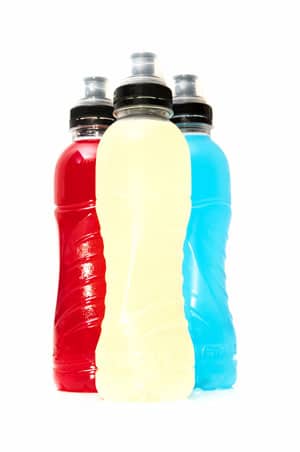Let’s Talk About Sports Drinks (Fact and Fiction)

You’re active, your children and/or grandchildren are active, the sun is hot, and a lot of physical energy is being spent doing the things you all love. Your first inclination for hydration is to pack the cooler with sports drinks. But is this the best choice? We are bombarded with bright, colorful drinks in the refrigerator sections of gas stations and grocery stores. Your own refrigerator may have these cheerful liquids inside just waiting to be opened and consumed. Voilá, you’re hydrated! Not so fast. Would you be surprised to learn that these drinks aren’t actually “hydrating” you very much? Since we have all become more diligent at checking the labels of the foods and beverages we buy, take a look at the ingredients of your favorite sports drink. It will commonly have at least one of these three ingredients: sugar, salt, and potassium.
#1 Sugar
Fact: Sugar tastes good.
Fiction: Sugar is needed for hydration.
Sugar is not hydrating. In fact, too much sugar, like consuming too much salt, can cause feelings of being dehydrated. Sugar can cause your blood sugar to elevate, and it can increase your heart rate. It can also cause an inflammatory response in your body, making you feel stiff and causing sore muscles. When I read the label of a sports drink, I like to calculate the sugar from grams to teaspoons; it helps me visualize how much is in there. While you can do this using any calculator, just know this simple math: There are 4.2 grams to one teaspoon. To make it easy and quick, divide the number 4 into the number of grams of sugar on the label, and you’ve got a good idea of how much sugar you are consuming. One of the most popular drinks on the market has 34 grams of sugar, which equates to 7.2 teaspoons for just one 16-ounce bottle! Sure, sugar is a quick energy source, but most of these drinks aren’t using raw or unrefined sugar. They are using a cheaper ingredient called high fructose corn syrup. This ingredient has a way of making our bodies actually crave it. Sugar will beget more sugar.
#2 Salt
Fact: Salt or sodium is needed for hydration.
Fiction: Salt is the best and only mineral I should need for hydration.
Salt is a wonderful mineral for endurance athletes to help them retain precious water. But for the majority of active people and for children (to whom these sports drinks are highly marketed), their daily diet may already contain plenty of salt. Adding salt to sports drinks does help you retain the fluid you’ve just consumed, but too much salt in your drinks and in your diet could make you more thirsty and can cause swelling in your joints.
#3 Potassium
Fact: Most people don’t know why potassium is important.
Fiction: Potassium is irrelevant for hydration.
Here is where I think the rubber meets the road. Potassium is absolutely essential to proper hydration. Unfortunately, our most common sports drinks don’t contain enough of this vital mineral. In fact, most Americans are potassium deficient due to eating processed foods and not enough fresh fruits and vegetables. On average, if you aren’t someone who is contending with chronic kidney disease, the recommended daily intake of potassium is 3,500 to 4,700 milligrams. To put this into context, one banana, a common source for potassium, generally has 450 milligrams. That means you would need to eat ten bananas just to reach the recommended daily allowance. Here’s why potassium is so important. Potassium is highly reactive in water. It also produces positively charged ions that help to conduct the electricity that flows through the body. Your heart, for example, beats because of electrical impulses. That being said, overly high quantities of potassium can be very dangerous. So how do you know what’s right for you? Getting a comprehensive blood test and consulting with your doctor about your mineral levels is the best way. You can also examine your diet. If you are someone who eats packaged and processed foods, chances are you are potassium deficient. If you are someone who suffers from muscle cramps, leg aches, and pain and have chronic headaches, you could be potassium deficient. Maybe you are someone who has food allergies to bananas and avocados (two great natural sources of potassium). You could be a candidate for a potassium supplement. Keep in mind that most daily multivitamins, while good for nutrient supplementation, still do not meet the recommended daily allowance for potassium.
So What Should You Drink to Replenish Electrolytes?
Sometimes plain water isn’t enough. I know a lot of people who drink a gallon of water every day. While it’s good to have such a healthy habit, you could also be unknowingly flushing out your vital minerals, leaving you dehydrated. First, let’s discern what electrolytes are and what their function is. Electrolytes are minerals, not sugar. These minerals serve different functions in the body, such as regulating electrical current and blood flow and aiding with muscle and tissue functions. Keep in mind that the body is 60 percent water. This is the first and most abundant resource you have to maintain balance in your system. Common electrolyte minerals are calcium, magnesium, potassium, and sodium.
Some natural resources that will replenish your electrolytes without the added sugar or dyes found in most sports drinks are:
Here is one of my favorite recipes
for a healthy sports drink:• 2 cups coconut water (unsweetened or naturally sweet)
• 1/8 teaspoon finely ground pink Himalayan salt 1/2 cup of lemon juice
• Honey, to tasteAdd to a blender or shake vigorously until all the ingredients are combined well.
Add your favorite fruit to turn this recipe into a delicious smoothie.
FUSION PHARMACY
_____
FUSION IS BETTER MEDICINE
Call, email, or come in and see us for more INFORMATION



